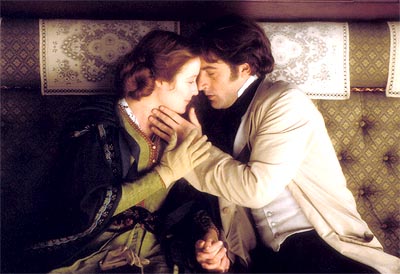

The first thing one notices about Possession is that one element sticks out like a sore thumb, and his name is Aaron Eckhart. It's not that his performance is not good; it's just that his inclusion change the entire dynamic of the movie. It is still enjoyable, but in a different manner. Instead of the literate, poetry-infused romantic love story to a more conventional, almost predictable one. Much of the brains of the story is now gone, but it is still fun to watch these scholars (probably some of the sexiest scholars in recent memory) excited about their work and the possibilities of scholastic discovery. Director Neil LaBute (Nurse Betty, Your Friends & Neighbors), playwright David Henry Hwang (Golden Gate, M. Butterfly) and Laura Jones (Angela's Ashes, Oscar and Lucinda) adapted the Booker Prize winning novel by A.S. Byatt. It's an odd troika of adapters that help retain some of the sense of the novel while changing the Roland Mitchell character from English to American.
LaBute seems an odd choice given the sentimentality and lushness of emotion present, but his penchant for the opposite feelings actually comes in handy sometimes here. An air of detachment exists in many of the characters, as if they are afraid to express themselves fully, whether because they are bound by socially accepted norms or by their own inhibitions. A slow release of emotional baggage happens over the course of Possession, as LaBute delves further into the story. Possession centers around Mitchell (Eckhart, The Pledge, Nurse Betty), a research assistant specializing in the poet Randolph Henry Ash, ex poet laureate. Mitchell discovers some potentially inflammatory love letters written by Ash to an unnamed woman. Ash was renowned for his unfailing fidelity to his wife. Despite the near lack of any empirical evidence, Mitchell believes the woman is Christabel LaMotte, another poet. He seeks out Dr. Maud Bailey (Gwyneth Paltrow, Austin Powers in Goldmember, Shallow Hal), who specializes in LaMotte and is also a distant relative. Bailey believes that Mitchell's theory is rubbish (one of the primary reasons being that LaMotte was a lesbian), yet the more the two research, the more evidence they find that supports it.
Possession cuts back and forth between Mitchell and Bailey in the present and Ash (Jeremy Northam, Gosford Park, Enigma) and LaMotte (Jennifer Ehle, Sunshine, This Year's Love) in the past. The two move concurrently, so as Mitchell and Bailey discover more about their relationship, LaBute shows more of what happened. Inevitably, with Mitchell and Bailey spending so much time together and reading love poetry to each other, they begin to fall for each other. In a way, their relationship parallels that of their research subjects by starting coolly, then heating up intensely. It is refreshing to see characters like Mitchell and Bailey who are using their minds to delve into a mystery. What is disappointing is the conventional nature of their romance. Mitchell is the hesitant man, and Bailey is the ice queen. Both are not looking for relationships, but both quickly fall for each other. Worse, Bailey is the thinking academic, and Mitchell is the impulsive, rude American who acts on hunches. These are old stereotypes that bring down the artistic level of the film, exchanging it for something more superficial.
The scenes that take place in the past show a new side of LaBute, that of period director. The England of yesteryear is a lush place, beautiful yet cold. Northam and Ehle are good in their roles, with characters that use words to verbally spar and express their love to each other. They also both have the snooty quality necessary for any period performance. LaBute spends more time in the present with Bailey and Mitchell than in the past with the two poets, which also contributes to the general feel of the movie. Even this relationship turns conventional as Possession enters its third act. Overall, it seems that LaBute tried to make a smart, literate film adaptation of a popular novel. He changed some facts, which irrevocably altered the tone of the movie, but not necessarily in a bad way. Possession is still a good movie, just not the one LaBute hoped to make. It's a little dumber and more stereotypical, but probably a little more fun.